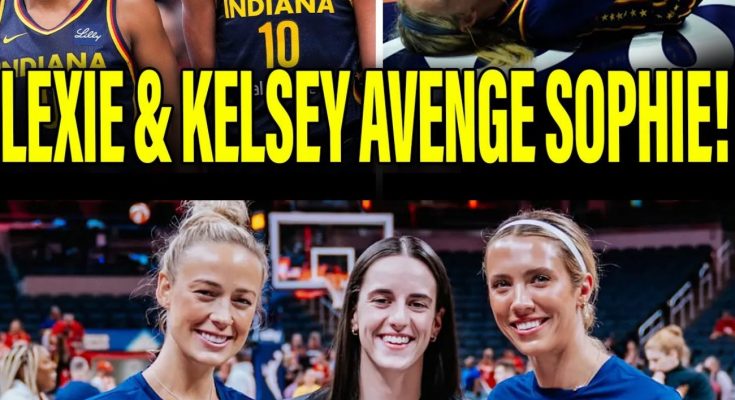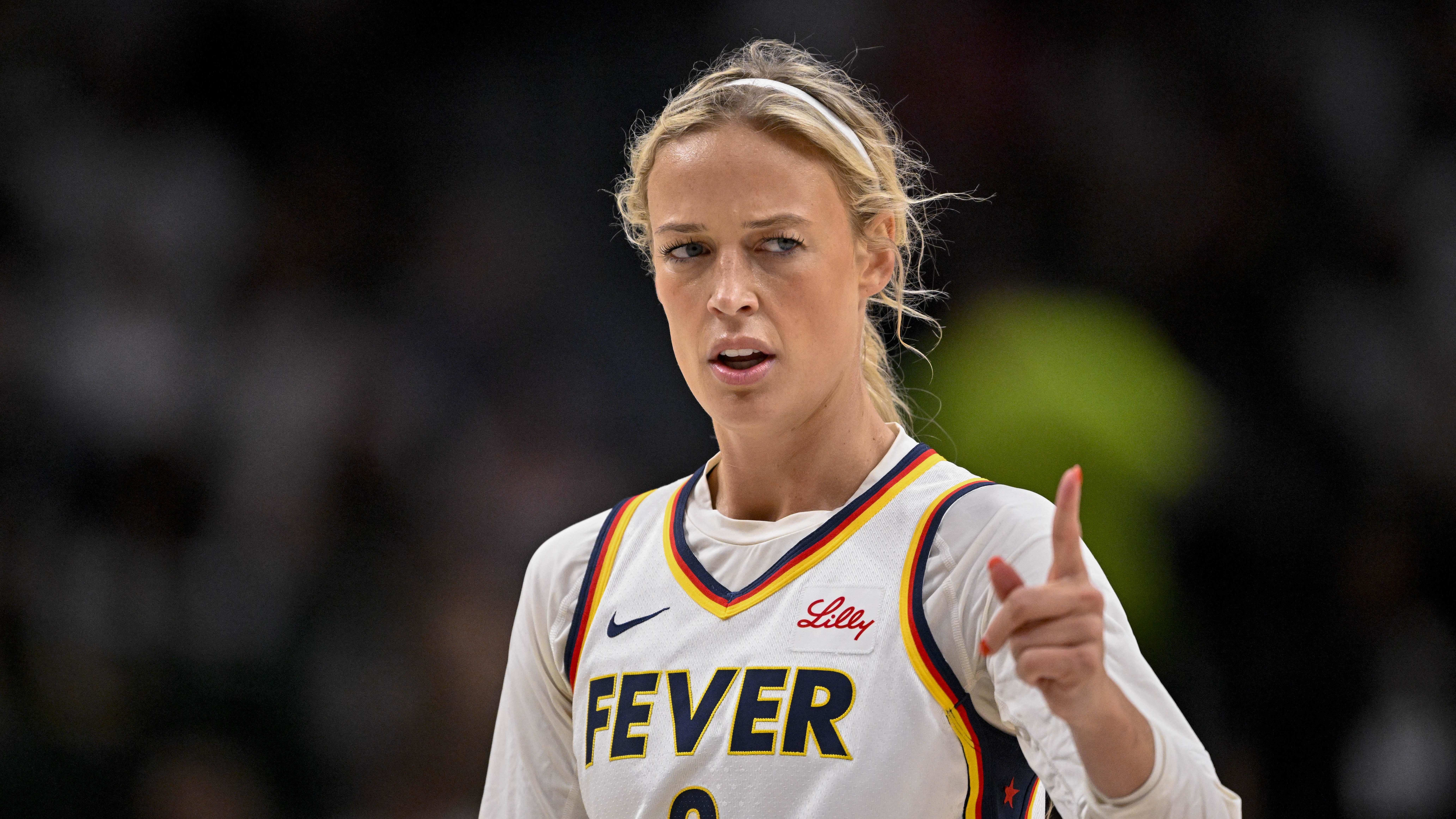The arena fell silent. One collision, one scream, and suddenly, the Indiana Fever’s already fragile season teetered on the edge of collapse. Sophie Cunningham lay on the floor clutching her knee, her pain echoing through every shocked gasp in the building. No whistle. No stoppage. No protection. Just outrage.

It was supposed to be another tough matchup against the Connecticut Sun. Instead, it became a night that exposed the WNBA’s officiating inconsistencies, reignited fury over player safety, and—against every possible odd—showcased one of the most jaw-dropping comebacks in franchise history.
And it all started with disaster.
The Collision That Changed Everything
Midway through the second quarter, Bria Hartley lost her balance while sliding across the lane and crashed directly into Cunningham’s right knee. The impact sent her sprawling, screaming, and unable to put weight on her leg. Trainers rushed in. Teammates stared in disbelief. Fans roared in anger.
But the officials? Silent.
No foul. No signal. The game carried on while Cunningham was carried off.
For Indiana fans, this was not an isolated accident. It was the latest in a disturbing pattern. Caitlin Clark’s groin injury from a reckless collision in July. JC Sheldon’s eye poke. Marina Mabrey’s hard foul. Over and over, Fever players have walked away bruised, battered, and—sometimes—sidelined. And yet, whistles rarely followed.
This time, Cunningham’s family made sure their fury was heard. Her sister Lindsay called out the WNBA directly, blasting officials for failing to protect athletes. Her mother Paula accused Hartley of playing “mean and out of control.” The frustration wasn’t just fan chatter. It was personal, raw, and impossible to ignore.
Fever on the Brink
The Cunningham injury wasn’t just painful—it was devastating for Indiana’s depth. Already without Caitlin Clark, Sydney Colson, and Aari McDonald, the Fever entered this game with zero true point guards available. Cunningham’s shooting and toughness were essential to the patched-together rotation. Losing her meant more than losing a player—it meant losing spacing, balance, and options.
At halftime, the situation looked hopeless. Indiana trailed big. Their rotation was stretched to breaking. Energy was low, and the Sun’s physicality was overwhelming. Every sign pointed toward collapse.
But collapse never came.
Kelsey Mitchell: Assassin Mode Activated
If there was ever a moment for someone to take over, this was it. And Kelsey Mitchell delivered like never before.
Quiet in the first half with just four points, Mitchell erupted after halftime with a performance that felt less like basketball and more like destiny. She demanded the ball, torched defenders, and dropped 34 points in the second half alone. By night’s end, she had 38 points total—the highest-scoring game in the league this season and the biggest offensive outburst of her career.
Step-backs. Deep threes. Ice-cold free throws. Every shot carried the weight of Indiana’s season. And every shot fell like a dagger.
By overtime, Connecticut had no answer. Mitchell wasn’t just scoring—she was dictating reality. With her, Indiana was unstoppable. Without her, this game would have been another painful loss.
Instead, she rewrote the story.
The Unsung Heroes of Survival
As spectacular as Mitchell’s explosion was, the Fever’s comeback was not a one-woman show.
Odyssey Sims, signed on a hardship contract just to keep the roster alive, played like she’d been there all season. Her 19 points and seven assists were crucial, but her composure under pressure was priceless. Breaking traps, organizing possessions, and feeding Mitchell in rhythm—Sims was the steady hand Indiana desperately needed.
Aaliyah Boston, already a franchise cornerstone, anchored the paint with 14 points, 13 rebounds, and five assists. It was her 15th double-double of the year, setting a franchise record. Boston’s presence was the safety net—grabbing boards, blocking shots, and creating second chances that fueled the rally.
Natasha Howard bullied her way to 18 points and nine rebounds, her physical play answering Connecticut’s toughness in the paint.
Lexi Hull, often overlooked, hit the biggest shot of the game. With under a minute left in overtime, she buried a corner three that sealed the Fever’s fate. Eight points on paper—but that one dagger carried the weight of the entire comeback.
Brianna Turner, quiet on the box score, shined defensively. Her activity, switching, and timely stops suffocated Connecticut when Indiana needed it most.
Every piece mattered. Every contribution stacked into the improbable.
The Largest Comeback in Franchise History
Down by 21. Shorthanded. Losing stars left and right. On paper, the Fever should have been buried by halftime.
Instead, they stormed back for a 99–93 overtime victory—the largest comeback in franchise history. A win that not only kept their playoff hopes alive but redefined what this team is made of.
Head coach Stephanie White summed it up simply: “We will never be counted out.”
The message was clear. Injuries, bad officiating, physical opponents—none of it would break this roster’s will.
A Team Fueled by Fury
But make no mistake—this wasn’t just resilience. It was rage.
Cunningham’s injury lit a fire that transformed frustration into fuel. The refusal to collapse wasn’t just about pride. It was about sending a message: the Fever may be battered, but they are not broken.
Every shot Mitchell drained. Every rebound Boston pulled. Every assist Sims dished. It was all a statement to the league, to officials, and to opponents: ignore us at your own risk.
The MVP Conversation
For Mitchell, this game was more than a highlight. It was a resume-builder.
With her 38-point masterpiece, she passed Tamika Catchings for the most 30-point games in franchise history. She climbed into the top five in league scoring. And she threw her name squarely into the MVP conversation.
Even Caitlin Clark, sidelined and watching from afar, chimed in with a two-word post: “MVP Kels.”
Mitchell isn’t just a placeholder while Clark heals. She is a franchise anchor in her own right. And on this night, she reminded the entire league.
What Comes Next
The Fever’s victory was more than a single win. It was proof of identity. A team many wrote off as too young, too injured, too unlucky—showed they are dangerous in ways that can’t be measured only on paper.
They are scrappy. They are stubborn. And now, they are battle-tested.
With the postseason still in sight, the Fever know the road won’t get easier. Minnesota looms. Clark’s status remains uncertain. Cunningham’s MRI could mean more time without key players.
But after surviving this game, the message is clear: underestimate Indiana at your own peril.
Final Word
What began as a night of pain ended as a night of history. Sophie Cunningham’s brutal injury exposed cracks in officiating and reignited conversations about player safety. But it also set the stage for Kelsey Mitchell’s greatest performance, for unsung heroes to rise, and for the Indiana Fever to carve out the largest comeback win in franchise history.
This wasn’t just basketball. It was resilience, defiance, and redemption on full display.
And if this team can survive a night like this, there’s no telling how far they can go.


